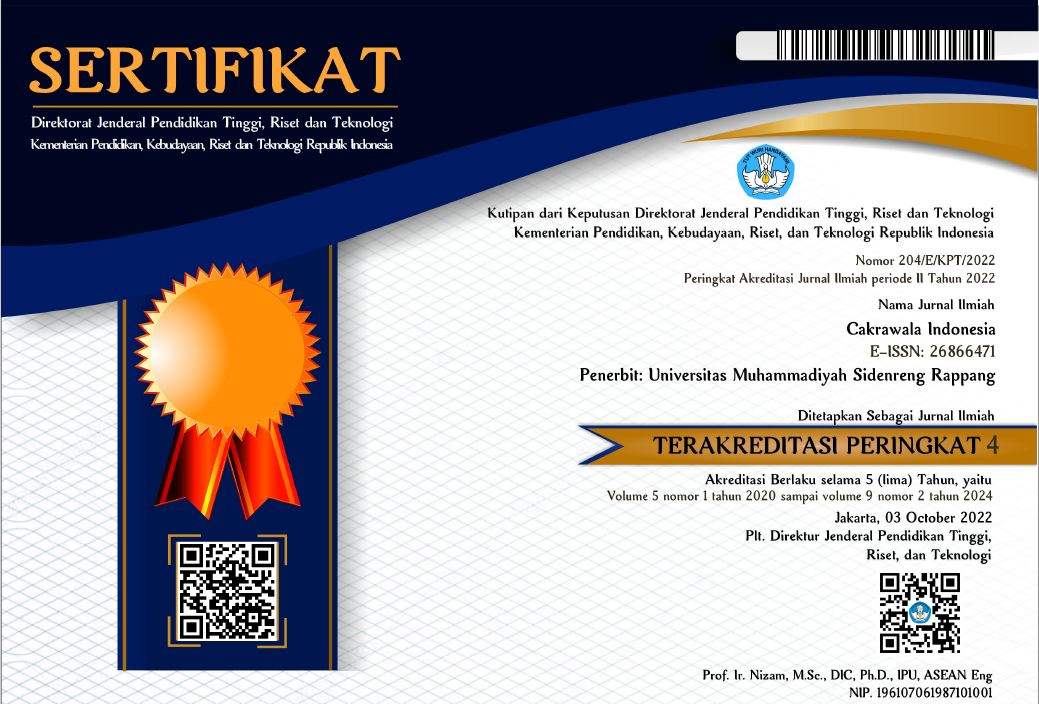Section Policies
Articles
Peer Review Process
Manuscripts sent to Cakrawala Indonesia undergo two review processes. Papers are first screened by the editors to ensure that the submission guidelines have been met. If a submission passes through the first review process, it will be assigned to reviewers while for those which do not pass the process will be returned to the authors.
Each article is reviewed by two independent reviewers through a blind review process. Reviewers would evaluate the manuscript substances, including the research originality, novelty, methodology, and contribution to science. Reviewers are responsible to make a decision on the article status based on the results of the evaluation. If reviewers do not agree each other, the editors would ask the third reviewer’s opinion. The results of the review would be sent by the editors back to the author with a note (one of the following): accepted without revision, accepted after major revision, accepted after minor revision, rejected.
The review process until final decision lasts within 4-8 weeks. However, the review process may take longer depending on the reviewers’ responses and the review cycle. Manuscripts sent back to Cakrawala Indonesia after revision can be reassigned to the reviewers according to the reviewers’ availability, editors’ decision, and the number of revisions to be made.
Publication Frequency
Cakrawala Indonesia is issued semiannually: in Mei and Nopember.
Open Access Policy
This journal provides immediate open access to its content on the principle that making research freely available to the public supports a greater global exchange of knowledge.
Plagiarism
Manuscripts submitted to Cakrawala Indonesia must be free from plagiarism, fabrication, and falsification. Authors are required to use an application for plagiarism check. The similarity level of a submission must be under ten percent. To avoid plagiarism, authors need to quote from other parties. Auto-plagiarism is also forbidden.
Before accepted, the manuscript is tested plagiarism using grammarly applications that are accessed online https://www.grammarly.com
Review Guidlines
Cakrawala Indonesia would really appreciate the reviewers’ to spend time on evaluating manuscripts submitted to our journal. Before agreeing to it, reviewers need to note some things as follows. First, reviewers need to inform the editors if reviewed manuscripts are not included in their areas of expertise. Second, reviewers need to inform the editors if they do not have adequate time to finish the review process. Third, reviewers need to inform the editors if they have conflict of interest with the reviewed manuscripts. This information will help the editors to determine the status of a manuscript.
The review process of a manuscript is confidential. Reviewers are not allowed to make a contact with the author or provide information to other parties related to the manuscript being reviewed. If it is necessary to contact other parties for information, reviewers must let the editors know.
All articles submitted to Cakrawala Indonesia must be free from plagiarism. Therefore, if a plagiarism practice is detected, reviewers need to contact the editors. So is the inaccuracy and use of dubious data. Reviewers are requested to evaluate articles based on a number of evaluative criteria, including novelty, clarity, quality, accuracy, relevance, and significance. Reviewers should review the articles objectively. Reviewers may leave comments on the manuscripts being reviewed in the form of review. These comments will help the author to develop their manuscript and improve their writing professionalism. Reviewers are also able to provide comments in the end of the Review Form.
After reviewing a manuscript, reviewers would be asked to make these following decisions: • Accepted • Accepted with revision • Revised and resubmit • Rejected





